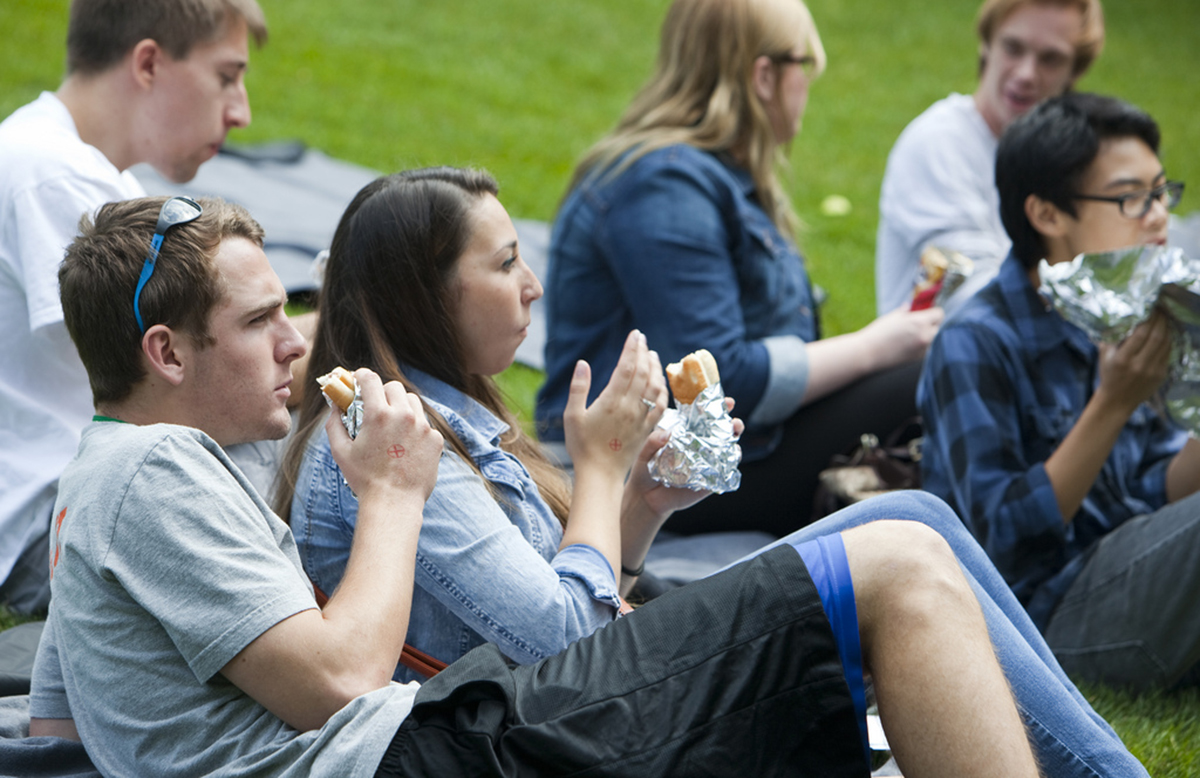You are ridiculously busy, money is probably tight, and you are unlikely to have access to a fully-equipped kitchen. Chances are that you've never prepared all of your own meals before either. Making sure you eat healthily in college is, in short, a bit of a challenge. Don't give up before you even started, though — prioritizing nutrition helps your brain work better, and will set a standard of healthy living for the rest of your life. How do you do it?

Plan Ahead
Planning ahead is one of the most crucial steps anyone who wants to eat healthily can take. The reason is simple: if you're already really hungry, you're bound to grab the easiest possible option, and that usually ends up being a less-than-ideal one.
By planning ahead, you're making a commitment to staying away from junk food most of the time. Advance planning is also going to save you an awful lot of money, if you do it well.
You can go the full nine yards and plan breakfast, lunch and dinner for the whole month. If this approach appeals to you, you might spend a few hours a month planning out recipes (tip: use the internet) and putting them into a spreadsheet. You can make a list of ingredients with a long shelf life — dried beans, chickpeas, rice, soy sauce, flour, that kind of thing — and purchase them at a set time of the month. Then, you might go shopping for fresh ingredients once a week. People who follow this approach can look around for the best deals they can get on the products they need, and they don't have to worry about what they'll eat after their initial planning.
Some people find that approach (much) too rigid, while others don't have the storage space they need to be able to shop in advance. They might still do well when they plan a week ahead, and perhaps only two daily meals rather than three. Students often live with room mates.
If that describes you too, you may try to get your room mates to agree to collective meal planning. You could each be responsible for planning and cooking one week of the month, for instance.
Since life is never as structured as a meal plan on a spreadsheet, you will want to allow for a few less healthy meals every week as well. You're bound to eat junk food sometimes, and that's going to happen more often when you're studying particularly hard and don't have time to cook, or when you go out with friends. If you know this will happen and plan for it, you make sure you don't have perfectly good food going off in the fridge.
Healthy Food On A Budget
Can you eat healthily on a really limited budget? The answer is quite simple — the more time you have available, the better the chances that you'll be able to put together a healthy diet on next to nothing. If you have time, you'll be able to cook from scratch, hunt for the best deals around, and go to multiple stores. If both your time and budget are limited, you're going to have to compromise somewhere.
One easy way to save money while not compromising on health is to try being a vegetarian. You'll be amazed how much money you can save this way. Another way in which you can keep your diet as healthy as possible without spending too much is making a list of staple foods, and adding whatever vegetables and proteins you can to those staples.
Ramen noodles aren't a recommended staple, as you probably guessed, and you don't want to rely too heavily on run-of-the-mill pasta either. What do you want to grab, then? Here are some options:
- Whole-wheat pasta
- Large potatoes for baking — you can go with sweet potatoes as well
- Rice — white rice is nice, but experiment a little because there are many thousands of species on the market
- Oats
- Beans, dried or canned and of any kind
- Lentils, chickpeas, quinoa
- Whole-wheat bread
- For breakfast, Greek yogurt is wonderful
See Also: Seven Surprising Tricks To Save Money On Food But Still Eat Well
You can add vegetables of almost any kind here, including frozen vegetables if you have to. Whatever you do, aim to eat at least five servings of fruit and veg in a day, and make sure to include proteins in your diet. Beans and legumes are a great source of protein, and you can also opt for eggs (which are cheap!) or tofu. Do not neglect to include calcium-rich foods like milk, yogurt, and cheese in your diet. Your body needs this stuff.
More Nutrition And Health Tips For Students
Keep It Simple
As a student, you're probably not going to want to spend hours in the kitchen. The good news is that that is not necessary to spend a long time on a healthy meal. Easy meals like vegetable-fried rice or whole-wheat pasta with tomato sauce and a side salad do not have to take you longer than 20 to 30 minutes to prepare, from start to finish.

Things like beans and chickpeas will take you longer, but you don't have to watch them boil. You can make use of this time by getting some studying in. You may also want to look into using a crock pot, which makes cooking almost effortless.
Identify Healthy Options For Eating Out
You will eat out. That's pretty inevitable. Why not look for healthy-ish and cheap places? Some eateries will offer student discounts. Others are cheap for everyone. Look around and ask others about affordable, tasty and healthy options for eating out. Joining clubs, doing volunteer work, and attending religious services will give you some opportunities to enjoy meals for free. Working at a restaurant is often a great way to get free meals as well. Just make sure you choose a restaurant with fairly nutritious meal options.
Alcohol
Alcohol is a really big deal, both in terms of the money you'll end up spending on it and what it does to your health. Have you ever heard that college students tend to gain quite a few pounds during their first year? Subsisting on a junk-food diet will definitely make that happen, but so will binge drinking. Alcoholic drinks are full of calories — and often sugar too — but don't have any nutritional value. Be the designated driver, or commit to drinking no more than a few units of alcohol. Remember, your body needs time off after a night on the town too. Never drink on consecutive days.
Stress Eating
Are you a stress eater? You're not alone. Many people turn to comfort foods when they're stressed, but also when they're bored or they can't focus on studying. Finding another way to channel stress and boredom would be great for your health. Instead of grabbing a bag of potato chips, why not do 10 push-ups and 10 ab crunches, take a walk around the block, phone someone you care about, or tidy up for 10 minutes?
Drinking plenty of water is good for your body, and it will also reduce your impulse to engage in comfort eating. When you're out, always carry a bottle of water with you to keep you hydrated and stop you from becoming dependent on the drink-equivalent of junk food, soft drinks.
See Also: Emotional Eating: Why Do We Eat When We Are Not Hungry?
On The Other Hand...
Don't starve yourself. Being obsessed with healthy nutrition is good. Avoiding unnecessary snacking is great. Skipping meals to save money or lose weight is not good at all. If you are overweight, remember that a calorie-restriction diet can work, but only if you use common sense. Getting to or maintaining a healthy weight is always a combination of sound diet choices and exercise. Fad diets or plain starving yourself will never give you the long-term solution you are looking for, and it will not help your brain work optimally either.
- Photo courtesy of COD Newsroom by Flickr: www.flickr.com/photos/codnewsroom/9686189309
- Photo courtesy of Matt Scott by Flickr: www.flickr.com/photos/ranna/1893307639


Your thoughts on this